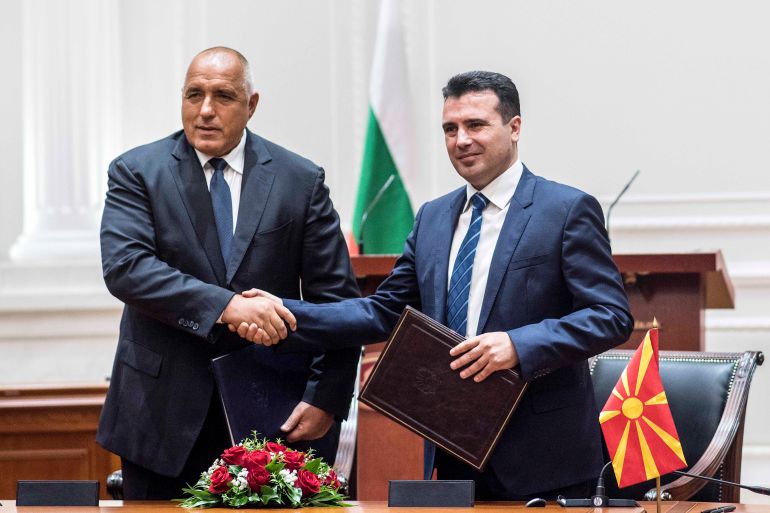On the Macedonian-Bulgarian dispute and historical revisionism
It is time for Macedonians and Bulgarians to move towards a political understanding of national identity.

In 2004, North Macedonia was one of the first post-Yugoslav states to receive an accession candidate status with the European Union. But 16 years on, the country is yet to open direct talks with the EU.
Over this decade and a half, Skopje has been presented with requirements that no other candidate state has: first to change its name and lately to change how it defines its official language and historiography.
Keep reading
list of 4 itemsEU lawmakers approve ‘right to repair’ law
Why is Germany maintaining economic ties with China?
Are more European nations finally moving to recognise Palestine statehood?
For years, Greece blocked North Macedonia’s accession due to its former constitutional name – Republic of Macedonia – arguing it implied claims over Greek cultural heritage, that of the Ancient Macedon kingdom and its celebrated emperor, Alexander the Great.
Hope was rekindled in 2018 when the issue was resolved with the signing of the so-called “Prespa Agreement”, which led to the renaming of the country to “Republic of North Macedonia”. Article 7 of the document specified that “Macedonian” referred to the Slavic language spoken in the country.
With the Greek veto lifted, North Macedonia was on track to become an official accession candidate this year. But in October, another neighbour – Bulgaria – decided to impose its own.
Bulgaria had been among the greatest supporters of North Macedonia’s accession to the EU. In 2017, the countries even signed an “Agreement on Good Neighborly Relations”, which as I wrote at that time, provided a model for pursuing a purely political understanding of national identity as a matter of self-determination to be viewed independently from history.
Today, Bulgaria accuses North Macedonia of not observing that agreement, with alleged violations ranging from lack of investment in infrastructure that would better connect the two countries to the slow pace of the binational historical commission set up to resolve historiographic differences. But the core of Bulgarian pretensions lies a challenge to the origin of the Macedonian nation and standardised language.
By raising this issue, Sofia actually went against the very core idea of its friendship agreement with Skopje: Regardless of when a nation is created and in what historical circumstances, once it is established, the right to self-identification as a nation becomes a sovereign right not to be disputed by any other sovereign entity.
Various Bulgarian officials have claimed that the Macedonians are Bulgarians but are unaware of this fact, while the Bulgarian Academy of Sciences has refused to refer to North Macedonia’s language as “Macedonian”, arguing instead that the language is merely a standardised version of a Bulgarian dialect. This is a very peculiar stance, considering the fact that an average student of linguistics would know that a standard language is actually the product of the codification of a certain dialect or a set of dialects.
On the question of historiography – yes, there are differences and yes, they have to be addressed. But one has to note that commissions tasked with settling intercultural and historical disagreements in Europe have worked for decades to resolve them. The German-French Textbook Commission, for example, has been active since the 1980s; the German-Polish one – since the 1970s. The Bulgarian-Macedonian commission only just started functioning a year ago, and this year it had to suspend its activities due to the COVID-19 pandemic.
It is also important to point out that the binational commission departs from the premise that the nation-state of North Macedonia was born within socialist Yugoslavia. So the Bulgarian insistence that the Macedonians “admit” this does not make sense and it seems solely motivated by the desire to humiliate.
Of course, there are domestic political reasons for the veto; the current Bulgarian government, a coalition of centrist and far-right powers, faced large protests calling for its resignation over the summer and is now struggling to deal with the COVID-19 pandemic. But there also seems to be persistent Bulgarian frustration with North Macedonia.
In the Bulgarian public sphere, there is often mention of Macedonian “bulgarophobia”. On this point, the Bulgarian side is probably correct and this phenomenon was recently exposed by the shameful domestic reactions to the interview Macedonian Prime Minister Zoran Zaev gave to Bulgarian News Agency BGNES on November 25.
Macedonian intellectuals and politicians, even those belonging or close to Zaev’s Social-Democratic Union, attacked the prime minister for his “capitulation to Bulgarian fascism” for saying during the interview that “Bulgaria is not fascism” and “Yugoslavia kept the two nations apart”. His words were interpreted as blasphemy, a profound insult to the proud Macedonian “anti-fascist resistance” against the Bulgarian occupation during World War II of what was at that time simply South Serbia.
An uncritical and exclusive equation of the Macedonian identity with antifascism and partisan heroism has been so normalised that those pointing out that not all Macedonians were antifascist and not all Bulgarians were fascist during the war, let alone nowadays, is perceived as an unspeakable heresy. The name of that heresy is “revisionism”.
There seems to be a consensus within Macedonian academia that “revisionism” is a self-explanatory negative term: revisiting parts of history that might help paint a more nuanced picture of Macedonian-Bulgarian relations seems to be unimaginable, even to some members of the Macedonian historical commission.
If the Bulgarian and Macedonian societies wish to combat their respective nationalisms and move forward and away from their ossified notions of national historiography, the Bulgarian veto must fall. It is also paramount that those Bulgarian and Macedonian intellectuals, who have been engaged in positive and constructive cross-border exchanges, do not get discouraged by the vicious attacks they have faced and persevere in their efforts to build bridges.
The views expressed in this article are the author’s own and do not necessarily reflect Al Jazeera’s editorial stance.
